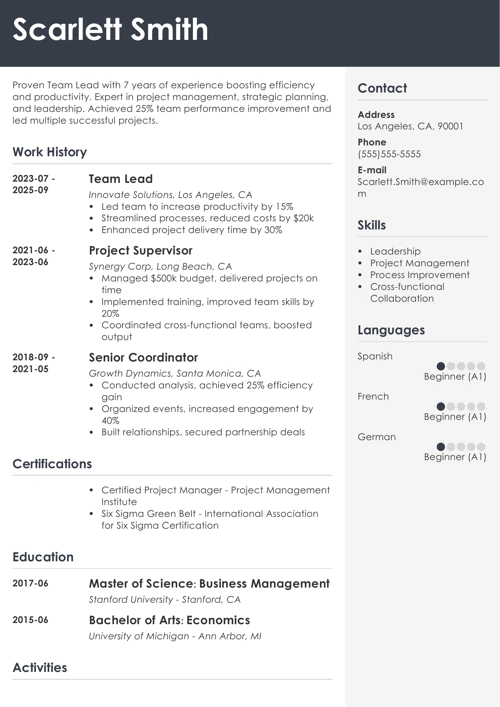The internet is full of advice on what to do when you lose a job in the later stages of your career. I find most of these tips very vague, as if their authors forget that you’re an actual person who has lost a job. Telling you to practice gratitude won’t help you, would it?
That’s why I narrowed my advice to 6 actionable tips for handling that stressful scenario. Let me guide you through navigating job loss later in your career and show you some steps designed to make you move forward confidently.
What to Do When You Lose a Job Later in Your Career?
Losing a job at any stage of life is challenging. I know it well from my own career story. However, for senior and older employees, it can be a really stressful and difficult situation.
I firmly believe that with a strategic approach, this can become a manageable state that might create new opportunities. Follow the tips below to prepare yourself for overcoming this challenge:
1. Pause and Reflect Before Making Your Action Plan
Losing a job is a significant life event. It’s important to take the time to pause and reflect before diving into your next steps. There’s nothing worse than making sudden decisions without a precise action plan, especially considering challenges in reemployment. Figuring out your next steps will help you clarify your goals and regain control over your future.
Start with acknowledging your emotions. After losing a job, you can feel frustrated, angry, or sad—especially if you’ve been in the same role for years. Take the time to process these emotions.
Then assess your goals. Think about what you truly want from the next phase of your career. Is it a peaceful employment that offers a great work-life balance? Is it the money? Or is it something you’ve always wanted to do? Consider whether you wish to stay in the same field, transition to something new, or even explore early retirement. Reflecting on these questions can guide your next steps and ensure they align with your long-term aspirations.
Remember: It’s never too late to Reflect on Your Career Goals
2. Work on Updating or Developing Your Skills
Staying competitive in today’s job market often requires investing in yourself through learning new skills. Keep developing your hard and soft skills to demonstrate adaptability and strengthen your candidacy.
Consider reskilling or upskilling. Gaining brand-new skills that align with current market demands or your career aspirations is always a good idea. Plus, today, it’s super easy! Platforms like Coursera, Udemy, or local community colleges offer flexible courses to help you stay relevant or prepare for a career change.
Another great idea is to focus on improving your digital literacy. If your field has experienced technological advancements, now it’s the best time to catch up and stay in the loop. Familiarize yourself with tools or software that are commonly used in your industry. For example, learning data analysis tools, project management software, or other relevant technologies can give you a competitive edge. Plus, it will look amazing in your application, making a truly stand-out resume!
Pro Tip: I know it’s tempting to focus only on your hard skills but remember: a perfect resume always combines your hard and soft skills.
3. Revamp Your Personal Brand & Online Profiles
A strong personal brand is critical for standing out in the job market. This includes updating your professional materials and creating a compelling online presence.
Begin with updating your resume. Focus on highlighting your transferable abilities, leadership skills, and most impressive accomplishments (accompanied by numbers!). Tailor your resume to each role you apply for, emphasizing your most recent wins to demonstrate your relevance.
Then, ensure your LinkedIn profile is polished and professional. Add any new licenses and certifications, and actively engage with industry-related content by sharing posts or joining discussions. A well-curated profile can open doors to networking opportunities and job leads.
Lastly, If applicable, create an online portfolioto showcase your work. This is particularly valuable for professionals in creative fields or those who’ve led notable projects. A portfolio allows employers to visualize your expertise and the impact of your work.
Nothing better for a resume than a brand-new look. Find one that suits you well: Modern Resume Templates
4. Use Your Professional Network Strategically
Networking is one of the most powerful tools for finding new opportunities, especially for experienced professionals with established connections.
Leverage existing networks. In your career, you’ve surely worked with someone who might help you now. Reach out to former colleagues, clients, and peers to let them know you’re exploring new opportunities. Many jobs are found through personal connections, so don’t hesitate to ask for referrals or leads.
You can also join professional groups. Expanding your network by attending industry meetups, joining LinkedIn groups, or participating in professional associations will only work in your favor. These groups can connect you with professionals who may have valuable advice or know of potential openings. Plus, they look great on a resume.
Consider becoming a mentor. Guiding younger professionals not only helps you stay active in your field but also builds your credibility. It can lead to unexpected opportunities, as mentees or their networks may connect you with new roles. Remember, sharing your knowledge through teaching or coaching can provide a steady income and a sense of fulfillment. Consider roles as an instructor, corporate trainer, or executive coach.
Pro Tip: Keep an eye on career hubs. The fastest-growing jobs in America will continue to seek new employers.
5. Explore Alternative Work Opportunities
Job loss can also be a chance to explore different types of work. Alternative roles may provide new challenges and bring fulfillment you haven’t considered before. Trust me, I haven’t been a career specialist all my life! And after changing careers, I am more satisfied with my work than ever.
But you don’t have to follow my steps. Your expertise is valuable, and consulting or freelancing jobs allow you to leverage your skills while maintaining flexibility. Explore freelancing platforms or use your network to find project-based work.
Another great solution is part-time or contract positions. They can provide financial stability while allowing you to explore other interests or career paths. Plus, these roles often lead to full-time opportunities, which is great.
And if you’ve ever considered starting your own business, this might be the time to explore that dream. Whether it’s a long-held passion or a skill you’ve developed, entrepreneurship can be both rewarding and empowering.
6. Overcome Age Bias by Showing Adaptability
Age-related stereotypes can be challenging for senior professionals, but there are ways to address and overcome them.
Focusing on your value will help you emphasize how your experience can solve problems, improve processes, and mentor younger employees. Position yourself as a problem-solver who delivers measurable results.
Show employers that you’re still in the loop. Stay active and adaptable by embracing industry trends. Highlight recent certifications or skills to demonstrate your relevance and competitiveness.
I know it’s difficult after losing a job, but try to approach opportunities with energy and confidence. Showing enthusiasm for learning and growth can help break down age-related stereotypes and make you a more attractive candidate.
Want to get inspired? I gathered some quotes that might help you: 100 Best Career Quotes

Summary
There are plenty of other tips on overcoming job loss later in your career, but I really wanted to skip the fluff and get straight to what works. Losing a job later in your career can be challenging, stressful, and very difficult to navigate. But if you keep calm and create a plan for that situation, you’ll see that it can also be an opportunity to reinvent yourself and explore new possibilities. Stay active, stay positive, keep your routines. Remember: Resilience will help you overcome challenges and keep moving forward, and persistence will pay off.
Stay calm. You’ve got this.
About Zety’s Editorial Process
This article has been reviewed by our editorial team to make sure it follows Zety's editorial guidelines. We’re committed to sharing our expertise and giving you trustworthy career advice tailored to your needs. High-quality content is what brings over 40 million readers to our site every year. But we don't stop there. Our team conducts original research to understand the job market better, and we pride ourselves on being quoted by top universities and prime media outlets from around the world.


